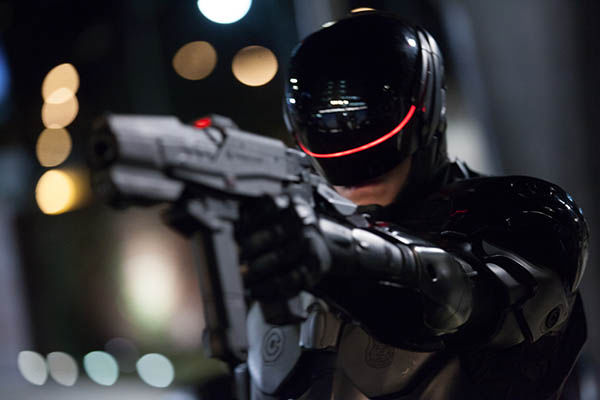It’s easy to blow off this week’s “Robocop” reboot as mindless trash eager to make a buck off of fading memories of the original 1987 film of the same name. Heading into a theater to watch an early screening, my hopes for the next two hours were minimal at best.
But I emerged from the theater utterly surprised and impressed, as this bold remake is packed with moral, ethical and philosophical quandaries that will keep audiences talking. The film addresses everything from drones and robots for national security to issues of artificial life support and how far to push it.
Add in a thoughtful exploration of free will and the conscience, and what truly defines a human life --- the body, the mind or the spirit --- and you’ve got a film that stands out.
The 1987 film was directed by controversial filmmaker Paul Verhoeven (“Basic Instinct,” “Total Recall,” “Showgirls”), who unleashed the wildly original action/satire, packed with lurid action and profanity. But an interesting premise lurked beneath its R-rated surface: What would happen if society eventually had a policeman who was half-man, half-robot?
And what would the ethical implications of that be, for the man himself and for society as a whole? You could save human lives by having robots instead of humans as police, but would that risk having police without consciences and the ability to discern complex situations?
“Verhoeven’s film already had a great idea in place, which is the connection between the automation of violence and fascism,” said Jose Padhila, director of the reboot. "If you replace a soldier with a machine, you take away the possibility of a policeman or soldier to not do something they ask of him. A machine doesn’t have an ethical perspective.”
The first “Robocop” made $70 million (about $150 million in today’s prices) and became a perennial cult hit on cable and DVD, spawning two vastly inferior sequels. But since a quarter-century has passed, Sony Pictures decided to reboot the movie and give it a 21st century spin.
The irony is that our present reality --- both in terms of what year we’re in, and the technology we have as a society --- has practically caught up to the first film. The film is loaded with questions, yet what’s truly remarkable is that it doesn’t force any of its answers.
It’s refreshing that a reboot is actually a better and much smarter than its predecessor.
Alex Murphy, a Detroit cop and family man, is almost killed by an explosion. He wakes to find his brain, heart, lungs and face encased in the body of a robot. He could be a gateway for other robots to take over all police functions..
“If you think about the first movie, you had Alex Murphy fighting against the directives in his head,” Padhila said. “So that character relies on the idea that you have to dehumanize the perpetrator in order to have fascism. We are getting very close to having robots replacing soldiers. We’re already seeing drones flying around, and we wanted to make this current.”
Padhila cited reports that the Pentagon had considered replacing soldiers with robots, so the film isn’t far-fetched. The character of Alex Murphy is a man with a conscience, he said, he has his memories. Part man, part robot. What does it mean to be a human being? Padhila asked. “Is it your brain, your body, or is it the software that makes you a man? It all boils down to the premise.”
Padhila’s not exaggerating when he points out how close this comes to the ethical issues facing drones.
The new film plays up Murphy’s marriage and fatherhood connections, as his wife is first placed in the harrowing position of having to decide whether to let Murphy die or to approve the surgery that will allow him to live, but largely as a robot. Murphy is at war between the programed cold-hearted actions and his human impulses of love, conscience and desire to be a good husband and parent. Both Joel Kinnaman as Murphy and Abbie Cornish as his conflicted yet ever-devoted wife are outstanding and provide a positive portrayal of a married couple sticking out an unbelievably difficult situation.
The reboot has limited foul language and frequent yet non-graphic violence, making it a film for teens and adults. It also has an ace cast with Kinnaman of AMC’s “The Killing” as the Robocop, and Michael Keaton, Gary Oldman and Cornish in support. Combining exciting action with a thrilling level of debatable issues, the new “Robocop” is a winner on all fronts. I urge you to see it.

